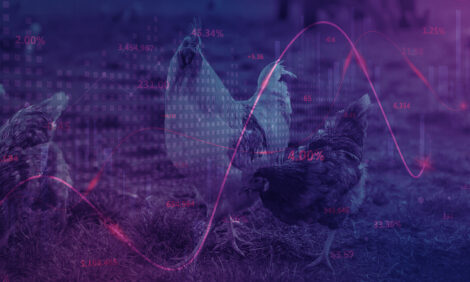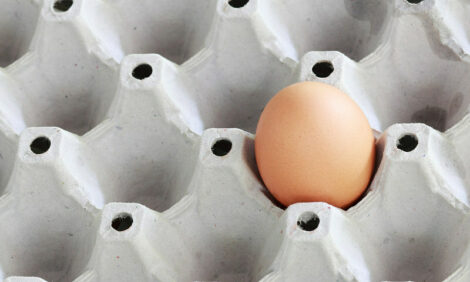



Overcoming choline chloride drawbacks with polyherbal choline supplement in poultry
VinColine offers solution to fattly liver syndromeSupplementation of Choline also referred as vitamin B4, is indispensable for efficient nutrient metabolism as it forms phospholipids and lecithins, which contributes in hepatic fat metabolism. It is present in all body tissues, where it forms a cell wall element in phospholipids, phosphatidylcholine (lecithin), lysophosphatidylcholine, choline plasmalogens and sphingomyelin form. Choline is a methyl group donor for hepatic detoxification and essential component for acetylcholine formation, an important neurotransmitter.
For poultry farmers seeking solutions for the fatty liver syndrome, VINCHOLINE has natural phytogenic active conjugates of choline having intrinsic bio-actives on liver physiology & metabolism and ensures maximum bioavailability
How much Choline is required in poultry?
Broilers require at least 1,200 mg/kg choline in their feeds, whereas growth performance continues to increase up to about 2,000 mg/kg. Feeding young chicks a diet with excess dietary protein or high in fat increases their choline requirement. On the other hand, layers require about 110 mg/day, which is approximately 1,100 mg/kg feed, as per NRC recommendations. Choline need is more for birds who produce larger eggs as choline is an integral part of the egg yolk.
The above levels correspond to total choline requirement and does not take into account the choline sparing effect of other methyl donor such as betaine and methionine.
Choline deficiency conditions in Chickens
Choline deficiency is predominantly to be a problem in newly hatched, and growing chicks with excess protein or high fat diet. Secondly, folic acid or vitamin B12 deficiency consecutively leads to choline shortage. In feeding, corn based feed require more choline in the diet.
Clinical signs like Stunted growth, Perosis, and Fatty liver condition due to abnormal accumulation of fat, are commonly seen in choline deficiency.
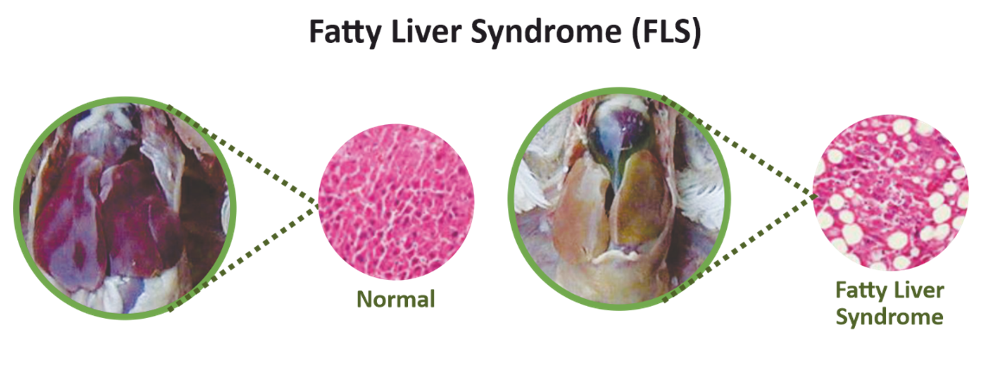
Choline sources in the poultry diet
Feed ingredients containing fat contains some choline thus it is supplied by all feeds that contain fat. Legumes, cereals and oilseed meals are the good source of choline. Corn is low in choline which forms roughly 55-60% of the corn-soya poultry diet, while wheat, barley and oats store twice as much as choline as corn.
Choline is usually added to animal diets in choline chloride form. However, this compound has many disadvantages such as it is highly hygroscopic, it oxidizes vitamins in the diet, and the formation of short-chain aliphatic amine tri-methylamine in the GI tract of the birds which gives repealing fishy taint to the chicken and eggs.
Nowadays, there are many researchers working on finding non-synthetic alternatives for antibiotics among the researchers. Choline is also present in plants in the phosphatidylcholine form, free choline and sphingomyelin. The promising effects of herbal plants on poultry have shown hypocholestrolemic effects and growth promotion which has drawn the scientist’s attention.
- Limitations of synthetic choline
- Being a quaternary base, it is poorly absorbed in the intestine
- Highly hygroscopic and unstable in nature
- Corrosive nature is a practical concern in processing units & feed mills
- Interacts adversely with Ionophores and Vitamins
- Only 1/3 of the choline chloride is absorbed; the other 2/3 are transformed into trimethylamine (TMA) during digestion by the intestinal flora; TMA is absorbed and can negatively affect the liver metabolism of birds, being also associated with the smell of fish in eggs.
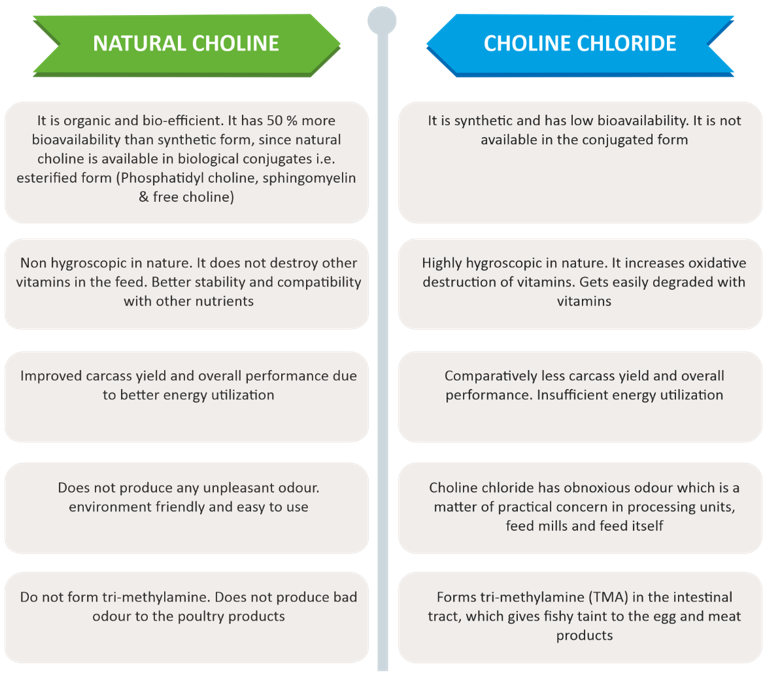
VinCholine, polyherbal formulation of enriched natural Choline for poultry
Vincholine is a natural choline supplement produced from Tinospora cordifolia, Andrographis paniculata, and Terminalia chebula, which is recognized in Ayurvedic Medicine. It has high content of choline in its esterified phosphatidylcholine form, free choline and sphingomyelin with high bioavailability. It can be an important alternative to the use of synthetic choline chloride. The results have shown that Vincholine can replace choline chloride in the poultry diets.
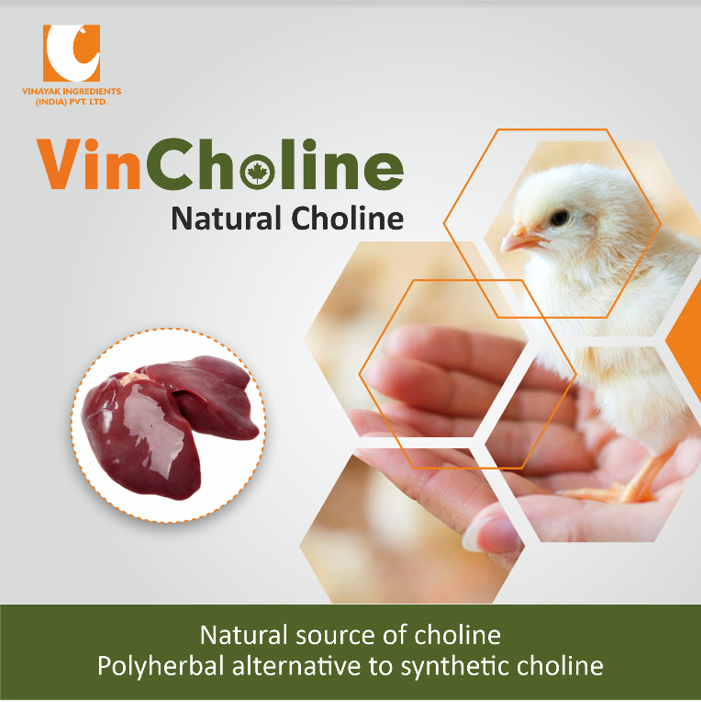
- Biological significance
- Restores growth retardation and improves FCR
- Manages clinical signs like Slipped tendon and Perosis
- Improves liver metabolism and prevents fatty liver syndrome
- Essential metabolite for building and maintaining cell structure, regulates integrity and porosity of cartilage matrix, and also helps faster recovery from diseases
- Essential for formation of acetylcholine (Neurotransmitter)
- Source of labile methyl groups for formation of methionine from homocysteine and creatine from guanidoacetic acid Higher choline bioavailability growth retardation Improved FCR Prevent FLS & Perosis
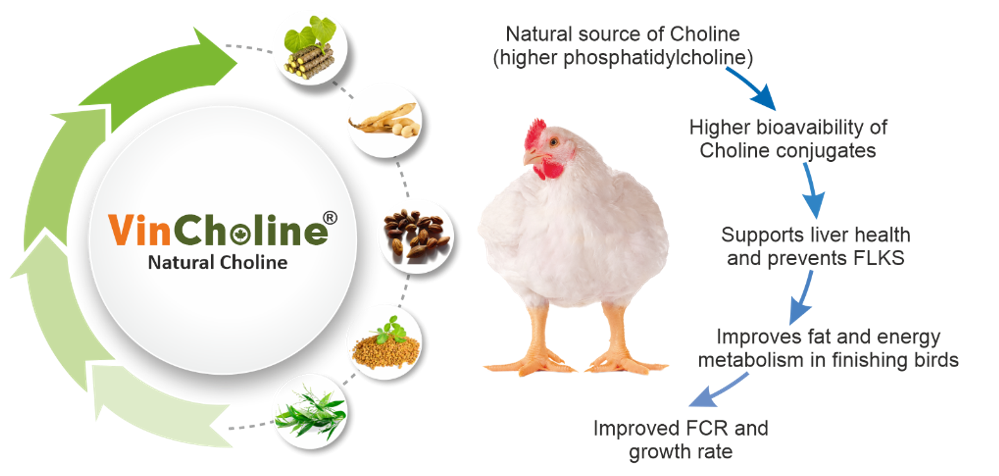
In field conditions, herbal choline demonstrated better performance than choline chloride in utilizing energy value of the feed, preventing fatty liver, and consequently improving feed efficiency and production performance.
Our advance research facility and pure quality phytoextracts made us possible to manufacture natural choline with the highest content of pure natural choline conjugates in the market.
Reach us out to know more about Vincholine or contact us at [email protected]









